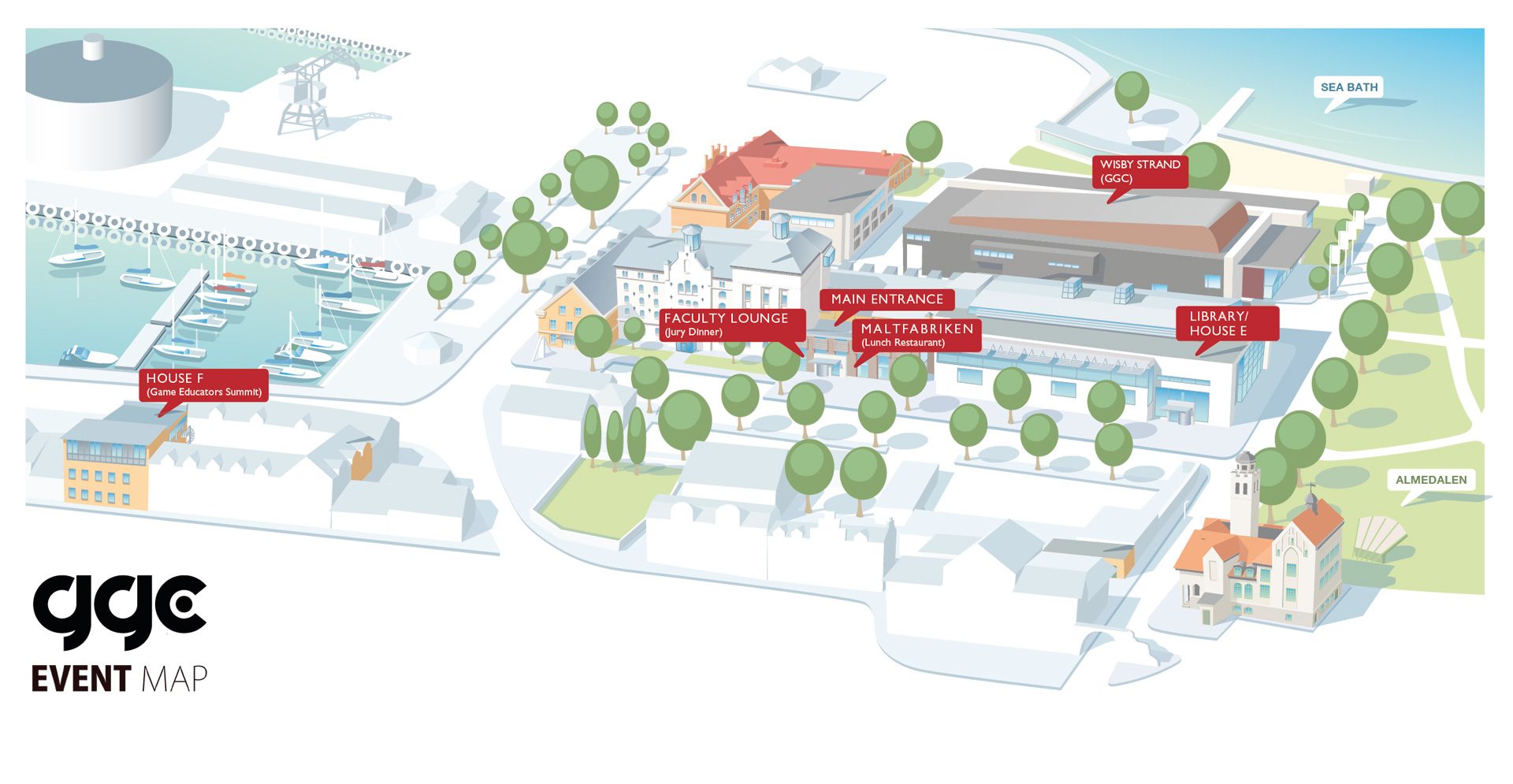
Schedule:
Fri, 7th of June, Room: F20
General: We use 10 minutes at the end of each presentation for questions. If we need longer, there’s lunch and the work afternoons.
12:00 Reception is open. Pick up your badge, and maybe take your lunch (not included!) in the campus or library cafeteria.
13:00 João Jacob. Game-based learning and Gamification
13:30 Andy Phelps. Teaching Game Production at Scale
14:10 Sabine Harrer. Teaching accountable game design
14:30 Coffee Break
14:40 Josefine Westborg. Game Design and Technology – Chalmers and GUs master program
15:00 Lissa Holloway-Attaway. Games and Cultural Heritage
15:40 Michael Sellers. The IGDA Building Blocks of a Video Game Curriculum
And Mike’s presentation leads into the Work Afternoon until…
17:45: Wrap up
18:30: Dinner at the campus Faculty Lounge
Sat, 8th of June, Room: F20
11:00 Adam Mayes. A case study in gamifying higher education
11:40 Ryan Brown. Making Your Classroom aLIVE
12:20 Lunch (included)
13:30 Jakob Berglund Rogert. Managing Student Groups
14:10 Mary Kayler. The Scavenged: A Case Study
And Work Afternoon on how we can teach in a more engaging way until…
16:45 Wrap Up
Presentations
These talks have been accepted to the The Educators Summit so far. We still need your voice – so please submit your presentation too (15-45 minute slots).
The IGDA Building Blocks of a Video Game Curriculum
Michael Sellers, Indiana University
Several of us (Freyjadis, Bown, Sellers) have been working on a new framework for video game education programs. We expect this to be complete and released by the IGDA in 2020. We are working to make this a set of building blocks that can be used as a guide to new and existing game programs to improve game-related education. This is also explicitly intended to be useful globally in a wide variety of institutional contexts. This presentation will show the current state of the framework with the intent of sparking feedback and discussion on it.
Teaching accountable game design
Sabine Harrer, Tampere University
We often tell our students that games are expressive, culturally valid, and even an art form. But how do we realise these big claims in the (video)game classroom? In this talk, I’ll share my efforts in teaching accountable (video)game design, an approach which draws from cultural studies and activism to teach students how to challenge their own unchecked assumptions about game culture, and equip them with the political literacy to “choose their own fate” in a field as potentially diverse and open-ended as game development.
Teaching Game Production at Scale
Andy Phelps – Rochester Institute of Technology and University of Canterbury
This is a review of 5 years of teaching game production in a capstone-like course that combined studio elements, coursework, student jobs, and more to ship 3 games that were available on XBOX One, Steam, Itch, Windows and more. It speaks directly to helping students scale work beyond the educational experience and into professional practice.
A case study in gamifying higher education
Adam Mayes. Uppsala University, Campus Gotland
Over the past 5 years, Pervasive Games – a course in, unsurprisingly, the design of pervasive games, has transformed from traditional university course to fully gamified experience – modeled as an open world role playing game. This presentation describes the process, it’s results and where the course goes from here.
Game-based learning and Gamification
João Jacob, LIACC, Faculdade de Engenharia da Universidade do Porto
Presenting a few Serious Games and Gamification projects related and cases studies in Portugal where I have participated.
Making Your Classroom aLIVE
University of Utah (EAE)
Three full time professors (Bown, Olson, Brown) who teach video game development will share their experiences in merging traditional pedagogy with new platforms for knowledge exchange (Twitch). This presentation will cover the following: A brief overview of what Twitch streaming is and how it can supplement traditional university education. Multiple examples of educational exercises that work well with Twitch and which do not. Unintended surprised and consequences such as: accessibility and recruitment. Attempt to answer the question: How can an open online classrooms change the future of education?
Games and Cultural Heritage
Lissa Holloway-Attaway, University of Skövde (Division of Game Development)
In this presentation I will review the ways in which ‘games and cultural heritage’ may combine to provide an interesting and dynamic context for game development and education. Designing ‘cultural heritage games’ combines many interdisciplinary interests and offers unique challenges for developers to create a range of games and playful interactions for museums and other heritage sites and related organizations. I will present curricula and share pedagogical strategies, including close work with external partners and cultural stakeholders, from our one-year Master’s Education, “Digital Narration: Games and Cultural Heritage” (60 ECTS), at the University of Skövde in Sweden. I will also preview the new two year Master’s Program we are developing that builds on this existing program, called “Games, Stories, And Aesthetics,” outlining its challenges.
Managing Student Groups
Jakob Berglund Rogert, Director of Studies, Department of Game Design (Uppsala University)
Having dealt with all thinkable and unthinkable ways of managing groups of students, caring for groups of students under the stress of game development and most recently, tried a draconian monitoring method for a course in which students form groups to create a digital game in ten weeks, Jakob would like to share his experience, so you do not have to.
The Scavenged: A Case Study
Mary Kayler, Embry-Riddle Aeronautical University
Adam Mayes, Uppsala University, Campus Gotland
In this session we will present a “proof of concept” alternative reality game (ARG) entitled The Scavenged, which immersed players into an entrepreneurial mindset using the 3 C’s: Curiosity, Connections, Creating Value, (see KEEN for more information about the 3 C’s) to promote problem-solving, critical thinking, and interpersonal skills development as players worked collaboratively to solve a mystery. The Scavenged incorporated three important aspects of the ARG genre: an immersive experience, the exploration of a narrative, and the collaboration of players towards goals making the experience engaging and suitable for a large number of players.
Alternative reality games (ARGs) provide an innovative approach to entrepreneurial mindset pedagogy; encouraging students to be curious, to practice skills in making connections and creating value, all while learning in an engaging and entertaining manner. ARGs ask players to pretend, they are living in a carefully constructed parallel universe that can include transmedia elements, websites, phones, and real objects hidden throughout the world (Phillips, 2012). Game mechanics allowed for a structured and controlled pace of game play as clues were placed at specific times and locations aligning with the release of narrative storyline and players responses.
Universities are looking beyond the traditional classroom lecture to teach students the skills associated with life-long learning and inculcate the sense of agency contained in the entrepreneurial mind-set. Results from the first time playing of The Scavenged suggest that ARGs have the potential to encourage curiosity, and develop skill in connecting and integrating data into knowledge from disparate sources. The ability of an ARG to encourage the skill of creating value is not as clear. With a modest redesign and administration of the game we believe that value creation will be accomplished as well. We will share lessons learned from our experience: what went well and what needs improvement. We will then open the conversation to the audience with the goal of identifying the means and the wisdom of using ARG’s at other universities.
Game Design and Technology – Chalmers and GUs master program
Josefine Westborg, Department of Computer Science and Engineering (shared between Gothenburg University and Chalmers University of technology)
This is a presentation an education that focuses more on how to develop game engines rather than on games.
18:30 Summit Dinner
Uppsala University and the Department of Game Design invites to a buffét-style dinner with local delicacies. The dinner will take place in our surprisingly cozy faculty lounge on Campus Gotland and includes the government-approved number of drinks (= 2 glasses of wine / beer or non-alcoholic). To prevent a sub-par lounging experience we’ll also provide drinks for purchase. This will be cash only, probably 20kr or so for a drink. Please bring change or (for the Swedes) be prepared to Swish.
There will be plenty of vegan and vegetarian options too.
